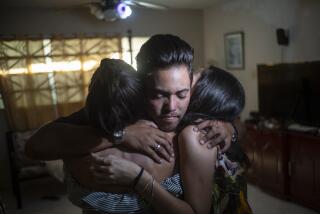The Best Way to Weaken Castro’s Hold on Cuba
- Share via
The Administration’s refusal to broaden its recent talks with Cuba beyond the refugee problem was seriously misguided. With the Cold War over, most Americans believe that we should do to the Cubans what we have done to the Russians, Chinese, Vietnamese, even the North Koreans--try to make friends with them. Yet, we cling to the hope that deteriorating economic conditions in Cuba will spark an uprising and force Fidel Castro to leave his island in disgrace. Judging from my observations and conversations during a recent tour of Cuba, such a scenario is very unlikely.
The Cuban man in the street likes Americans and their life style. But they profoundly resent our imperial and interventionist attitude. Cubans see in current U.S. policy a revival of the hateful Platt Amendment in their 1902 constitution, which gave the United States the right to intervene in Cuba’s affairs whenever it saw fit. The United States abrogated this “right” in 1934 as part of President Franklin D. Roosevelt’s “good neighbor policy.” But it retains, over Cuban objections, its base at Guantanamo, paying about $1,000 a year in rent.
Cubans say they are poor communists but are ardent revolutionaries. What does this mean? There is no shortage of criticism of Castro’s regime, but it is directed toward how to make things better, not how to overthrow the system. This important distinction appears lost to U.S. policy makers.
By now, the Cuban revolution has produced a socialist generation. In 1960, opponents of the revolution either fled Cuba, were executed or imprisoned as counter-revolutionaries. Accordingly, people in Cuba today are a substantially different breed from the Fulgencio Batista generation. They overwhelmingly support revolutionary changes. We must accept this fact whether or not we like it.
If we substitute social reform for communist revolution , we will better understand Cuba. Before 1960, living conditions for the vast majority of Cubans were wretched. Power, privilege, wealth, education and health care belonged to a mostly white, professional upper class. So many of them fled in 1960 that the University of Havana was left with about 17 professors. A similar brain drain affected other professions. To be a Cuban revolutionary was to want social equality, public education, health and jobs, as well as a chance to get ahead.
Early in his regime, Castro committed a cardinal sin when he set out his goals for a new Cuba. He asserted that Cuba’s future would be free of U.S. political domination. Within days, the U.S. media launched the virulently anti-Castro themes that still, in one degree or another, infect reporting on Cuba. The new Cuban leader replied in kind. Soon, bilateral relations deteriorated to the point where President Dwight D. Eisenhower approved plans for an invasion of Cuba by U.S.-financed Cuban exiles. It fell to newly elected President John F. Kennedy to carry out the invasion at the Bay of Pigs in April, 1961.
While honorable people can differ over the cause of the bilateral friction, Cubans reminded me that only after 1960 was a successful plan devised to wipe out illiteracy. Public education, from primary schools to Ph.D. programs, was soon available. Public health services became almost universal and better than in most Latin American countries. Cuba now has about 55,000 doctors. Public housing is plain to see. And women have free access to education at all levels, and the best jobs as well. Such social gains define revolutionary reform in Cuba.
President Bill Clinton may fall into the trap that embarrassed Kennedy if he fails to realize that U.S. hostility toward Castro has helped him remain in power, not weakened him. Fears of another U.S. invasion are real enough to justify political controls that Cubans grumble about but accept. Each week for years, Radio Marti has broadcast thousands of hours of exhortations to sabotage, overthrow or flee from the tyrant Castro. Cubans I spoke with laughed at the clumsiness of these broadcasts from Florida, but claimed they are proof of continual U.S. hostility. Said one youth who served two years in Angola and studied electrical engineering in Budapest: “ . . . those fat cat Cubans in Miami will never overthrow the revolution. If you send in Marines to help them, we have over 500,000 like me who will take to the hills, if need be. We are all set.”
The 32-year-old embargo has taken its toll. Cuban high school students must work on farms half time. Food is rationed. Since the Soviet Union broke up, Cubans, on average, are said to have lost 25 pounds--and that includes government officials. I saw a pediatric ward with 23 cribs and only three thermometers. Only children up to age 7 get rationed milk; most adults eat one good meal a day.
On my last day in Cuba, I shot a video of a pregnant woman. She pointed to a raft that she and her husband planned to use to get to Florida that night. “My baby will be born in Guantanamo,” she said with a smile. “Do you think it will be American?” By now, she is either in a Guantanamo camp or drowned.
Normalizing relations between two neighbors with a common heritage of values will go far to promote healing and redeem our national dignity. Clinton should summon the courage to do what is fair and wise, and end the U.S. economic blockade of Cuba. To skeptics, I would say, see Cuba for yourself.
More to Read
Get the L.A. Times Politics newsletter
Deeply reported insights into legislation, politics and policy from Sacramento, Washington and beyond. In your inbox twice per week.
You may occasionally receive promotional content from the Los Angeles Times.










